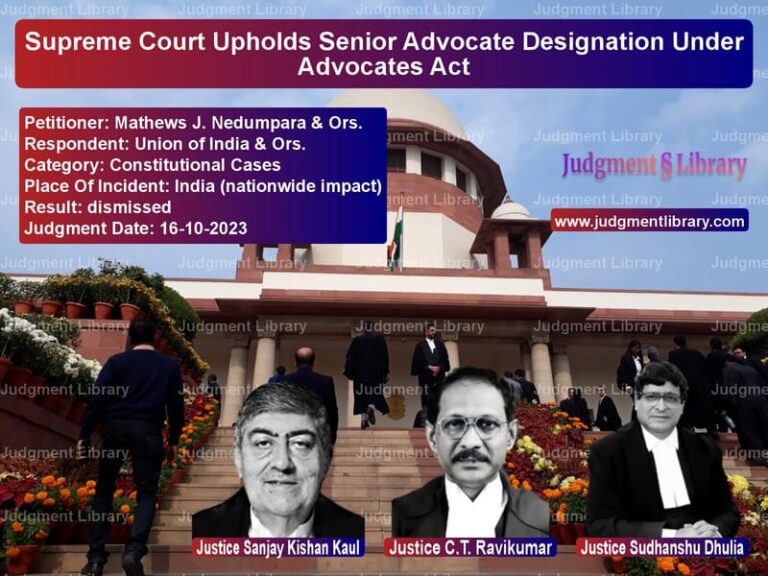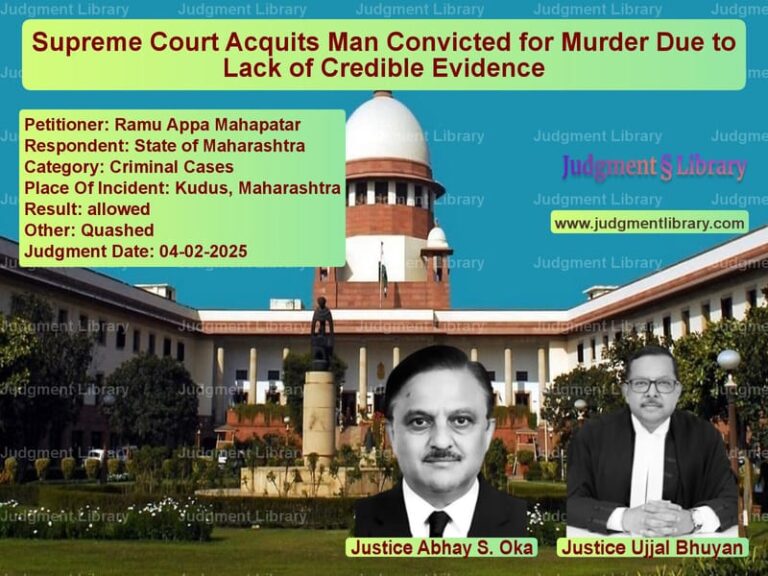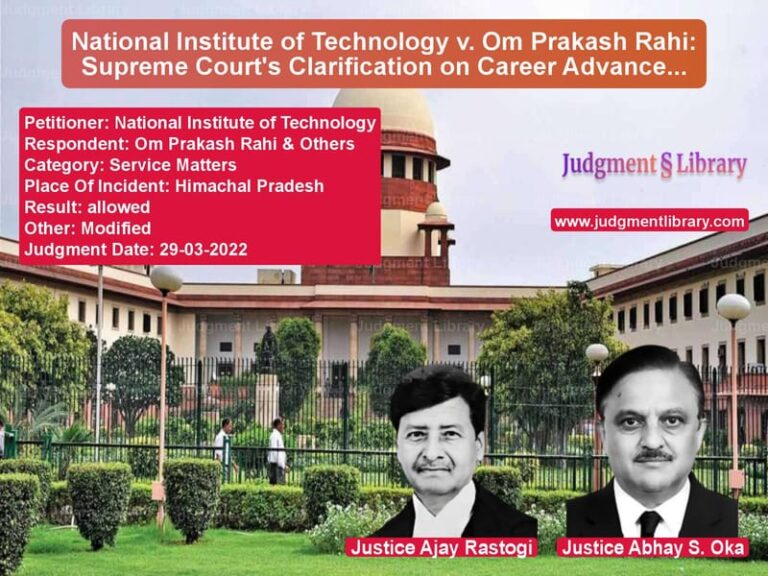CBI vs Kalyan Singh & Others: Babri Masjid Demolition Case and Legal Battle
The demolition of the Babri Masjid on December 6, 1992, remains one of the most controversial events in Indian history. The legal battle that followed involved multiple FIRs, prolonged investigations, and several judicial pronouncements. The Supreme Court judgment in the case of State (through) Central Bureau of Investigation vs. Shri Kalyan Singh & Others is a significant milestone in the quest for justice in this matter. The case primarily dealt with the charges of criminal conspiracy against prominent leaders and the procedural challenges faced in ensuring a fair trial.
The case was brought before the Supreme Court following the procedural mismanagement of FIR No. 198 of 1992. The judgment delivered by the bench of Justices R.F. Nariman and Pinaki Chandra Ghose addressed the long-standing delays, ensuring that a proper joint trial took place for all accused persons involved in the conspiracy.
Background and Initial Investigation
The demolition of the Babri Masjid led to the registration of two primary FIRs on December 6, 1992. FIR No. 197 of 1992 was filed against thousands of kar sevaks for various offenses under the Indian Penal Code (IPC), including dacoity, robbery, causing hurt, injuring places of worship, and promoting enmity between groups. This FIR included charges under Sections 153-A, 295, 297, 332, 337, 338, 395, and 397 of the IPC.
FIR No. 198 of 1992 was lodged against eight key individuals, including L.K. Advani, Ashok Singhal, Vinay Katiar, Uma Bharti, Sadhvi Ritambara, Murli Manohar Joshi, Giriraj Kishore, and Vishnu Hari Dalmia. These individuals were charged under Sections 153-A, 153-B, and 505 of the IPC for allegedly inciting violence through their speeches and actions. Over time, additional FIRs were registered, leading to a total of 46 cognizable and 1 non-cognizable FIR.
Legal Proceedings and Jurisdictional Challenges
Initially, the cases were assigned to a Special Court in Lalitpur, Uttar Pradesh. However, through notifications issued by the state government in consultation with the High Court, these cases were transferred to a Special Court in Lucknow on September 8, 1993. Importantly, only FIR No. 197 of 1992 was included in this transfer, leaving FIR No. 198 of 1992 outside the purview of the Lucknow court.
The Central Bureau of Investigation (CBI) took over the case and filed a consolidated chargesheet on October 5, 1993, against 48 individuals, including several high-profile leaders. Notable names included Bala Saheb Thackeray, Kalyan Singh, Moreshwar Save, Champat Rai Bansal, Satish Pradhan, Mahant Avaidyanath, Dharam Das, Mahant Nritya Gopal Das, and others. The charge of criminal conspiracy (Section 120-B IPC) was also added to FIR No. 197 of 1992.
CBI’s Consolidated Chargesheet
The CBI’s chargesheet accused the named individuals of planning and executing a conspiracy to demolish the Babri Masjid. The document detailed speeches, mobilization efforts, and specific instructions given to the kar sevaks. According to the CBI, the accused actively participated in a premeditated effort that led to the demolition.
In response, on September 8, 1993, the state government amended its notification to include FIR No. 198 of 1992 in the Lucknow court’s jurisdiction. However, this notification lacked consultation with the High Court, a procedural flaw that ultimately led to its invalidation. The Allahabad High Court struck down the notification, preventing the joint trial of FIR No. 198 of 1992 with FIR No. 197 of 1992.
Judicial Findings and Supreme Court Intervention
Despite procedural hurdles, the CBI filed a supplementary chargesheet in 1996 at Lucknow. The Special Judge at Lucknow, on September 9, 1997, ruled that a prima facie case existed against all accused for criminal conspiracy under Section 120-B IPC, along with related offenses. However, due to jurisdictional complications, certain accused were discharged, and their cases were redirected to a separate court in Rae Bareilly.
The Allahabad High Court’s judgment of February 12, 2001, played a crucial role in shaping the legal proceedings. The key findings included:
- The amended notification of October 8, 1993, was invalid due to lack of consultation with the High Court.
- The Special Court at Lucknow had no jurisdiction to try the accused under FIR No. 198 of 1992.
- However, the joint chargesheet filed by the CBI was upheld, as it established that all offenses arose from the same transaction.
The CBI’s request to rectify the notification was rejected by the state government in 2002, and no challenge was filed against this decision. This led to a fragmented prosecution where FIR No. 198 of 1992 was being tried separately at Rae Bareilly.
Supreme Court Judgment
In its judgment delivered on April 19, 2017, the Supreme Court criticized the delays and procedural mismanagement that had prolonged the case for over 25 years. The key directives of the Supreme Court included:
- Transferring all proceedings related to FIR No. 198 of 1992 from Rae Bareilly to Lucknow.
- Framing additional charges under Section 120-B IPC against L.K. Advani, Vinay Katiar, Uma Bharti, Sadhvi Ritambara, Murli Manohar Joshi, and Vishnu Hari Dalmia.
- Expediting the trial on a day-to-day basis, with no adjournments except in extreme circumstances.
- Ensuring that all prosecution witnesses remain present on designated dates.
- Completing the trial within two years.
The court made it clear that any non-compliance with these directives would invite further judicial intervention. The ruling reinforced the Supreme Court’s commitment to upholding justice in cases of national significance.
Conclusion
The Supreme Court’s judgment in this case was a crucial step in ensuring accountability for the demolition of the Babri Masjid. By consolidating the trials and setting strict timelines, the court aimed to prevent further delays in delivering justice. The case serves as a reminder of the importance of due process and the challenges of prosecuting politically sensitive cases in India’s judicial system.
Don’t miss out on the full details! Download the complete judgment in PDF format below and gain valuable insights instantly!
Download Judgment: State (through) Cent vs Shri Kalyan Singh & Supreme Court of India Judgment Dated 19-04-2017.pdf
Direct Downlaod Judgment: Direct downlaod this Judgment
See all petitions in Attempt to Murder Cases
See all petitions in Fraud and Forgery
See all petitions in Custodial Deaths and Police Misconduct
See all petitions in Judgment by Rohinton Fali Nariman
See all petitions in Judgment by Pinaki Chandra Ghose
See all petitions in allowed
See all petitions in supreme court of India judgments April 2017
See all petitions in 2017 judgments
See all posts in Criminal Cases Category
See all allowed petitions in Criminal Cases Category
See all Dismissed petitions in Criminal Cases Category
See all partially allowed petitions in Criminal Cases Category







